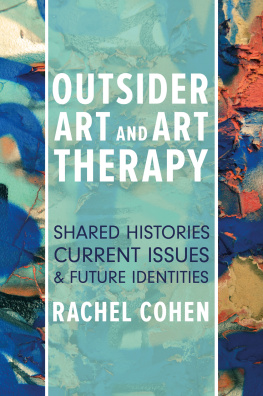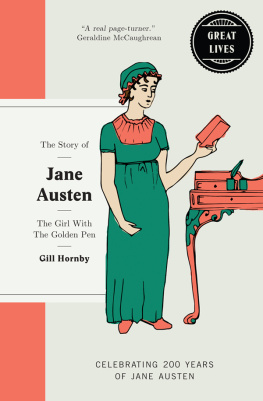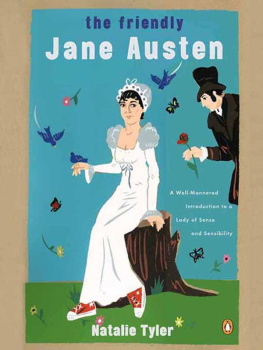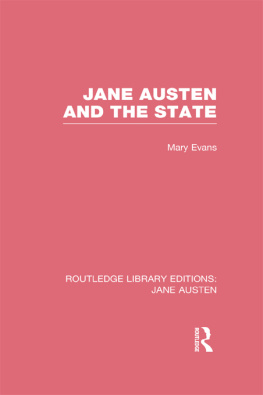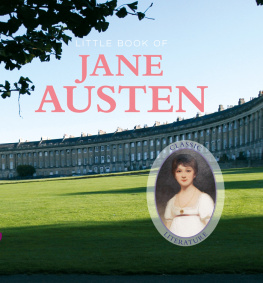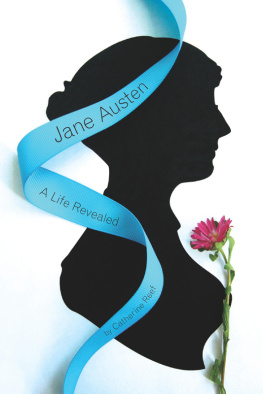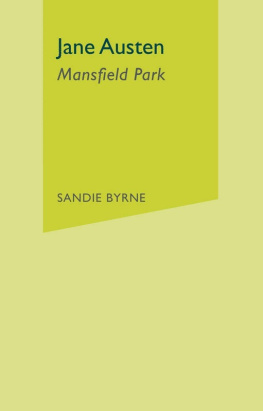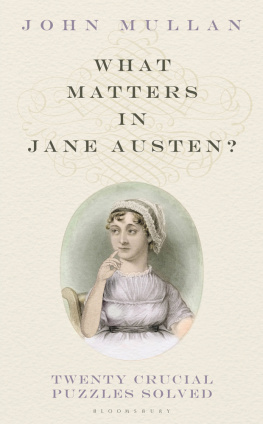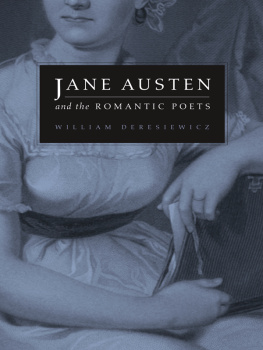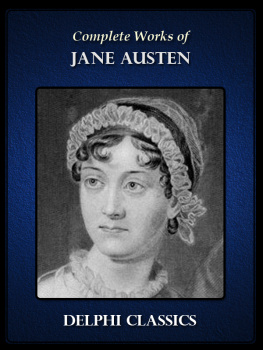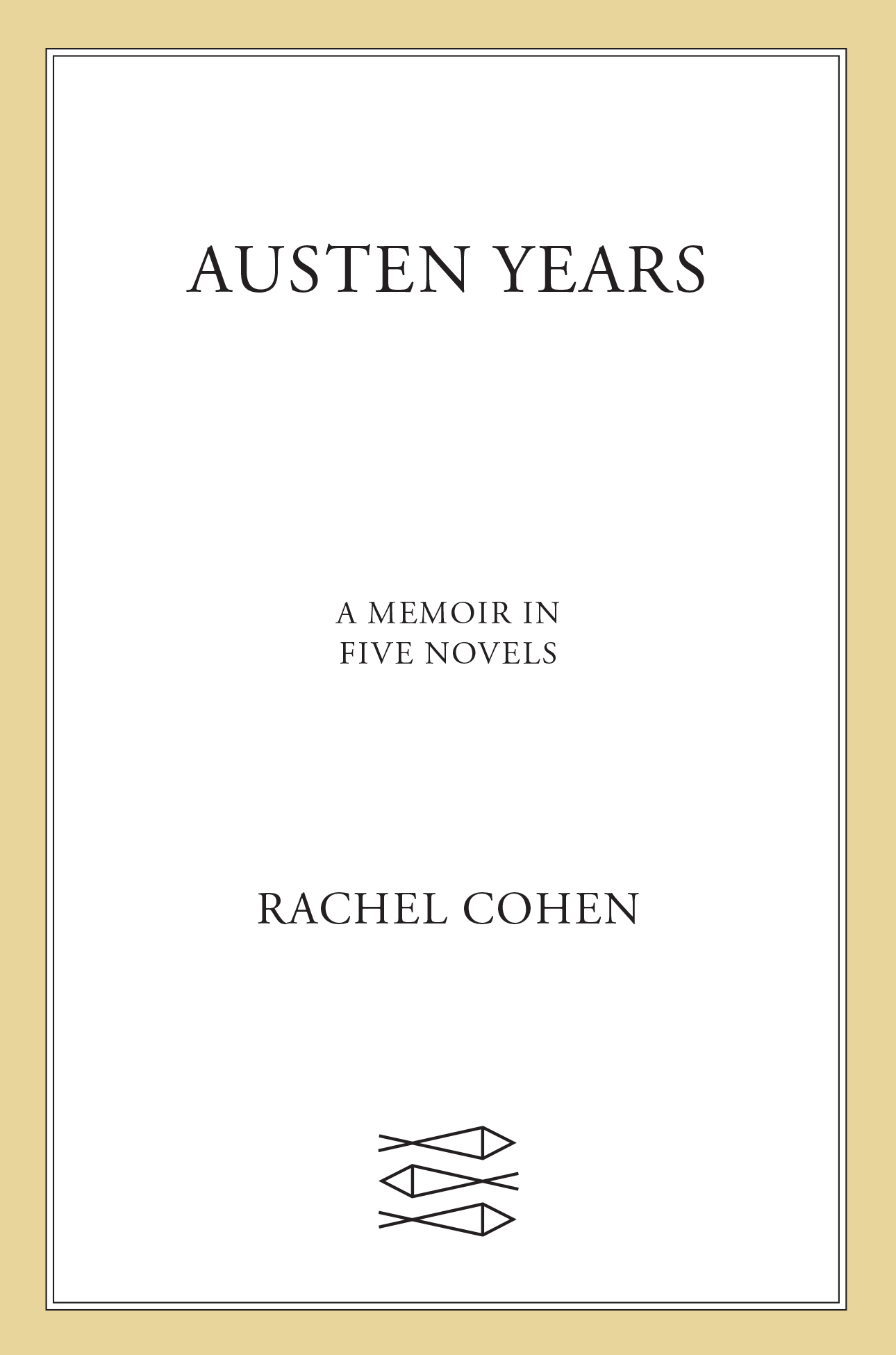The author and publisher have provided this e-book to you for your personal use only. You may not make this e-book publicly available in any way. Copyright infringement is against the law. If you believe the copy of this e-book you are reading infringes on the authors copyright, please notify the publisher at: us.macmillanusa.com/piracy.
In a small way having children learn to read is a warning of their growing up and leaving home.
She read it again. Widely different was the effect of a second perusal.
A READER
About seven years ago, not too long before our daughter was born, and a year before my father died, Jane Austen became my only author. I began to read her before sleep every night, and when I woke in the night; I read her at my desk when I couldnt make progress with the biography I was supposed to have finished writing, and on the slow bus that crossed the river to the ob-gyn. I would come to the end of a scene and turn the leaves back to read it again, almost without noticing. I was not sure what to make of my condition.
Was this a retreat, a seclusion? Life was running thin and fast across unfamiliar land. A baby was coming, a baby that M and I had wanted for a long time. We had known each other for twenty-one years and had been together for four. He and I are both slow to step forward. I had lived and taught in New York, but now we were where he taught, in Cambridge, Massachusetts. The rhythm of days altered.
My father was ill. His cancer had recurred two years before I got pregnant. We were going forward, and we were also waiting. Sometimes anticipation was joyful; at other moments, time held like that odd prolongation one may feel right before an accident.
The world careened. When I saw pictures in the news of people who had been hurt, or killed, I was newly aware of the mourners at the edges and beyond the edges of the pictures. Over every person I saw cross the street seemed to hover the anxious thought That is a mothers child. I had stopped teaching and did not have a place to tend. The weather, the seasons, were unpredictable and strange. At night, I folded up the day, as I did the small clothes people were giving us, uneasily.
In the past, as I had worked on writing my first book, and on different series of essays, if anyone happened to ask me what I was reading, I was relieved. To say Im reading James Baldwin, or Im reading Russian poets, was to give the truthful answer one never does to the polite question How are you? I had meant, among other things, Im paying attention. Now I sat on the bus that went across the river, with a finger holding a place in Persuasion, and heard again in my mind the sound of the coming babys heartbeat. On the pages, there was asperity, definiteness, endings known, bearable, even triumphant. Still, if you had told me that years were coming when I would hardly pick up another serious writer with any real concentration, that the doings of a few English families would come to define almost the entire territory of my reading imagination, and that I would reach a point of such familiarity that I would simply let Austens books fall open and read a sentence or two as people in other times and places might use an almanac to soothe and predict, I would have been appalled.
The baby was born, in spring. Light and sound ran through her, every lamp, every shadow of a leaf. I would walk with her in the streets around our apartment, stepping softly because she would startle awake at any passing car. I tried to be with her, I was with her, in that hushed iridescence. This is still the atmosphere around S, quiet, intent.
In those first months, I would sometimes walk with her into one of two used bookstores, but the books seemed almost to repel me. I bought other copies of Jane Austens novels, ones with abstract covers, or interesting prefaces. In the evenings, we would put S to sleep next to our bed, in the cradle that had been mine when I was a baby, and then my sisters, then, decades later, her daughters, and now was ours. M and I had attached a mobile with soft turtles to it; the light from the streetlamp outside would shadow the turtles on the wall, and they would tremble as S moved a little in her sleep. Coming and going in the night, I would read a few lines from Persuasion, and then a few more.
There was repose near Anne Elliot, who was experienced, and thoughtful. She had fallen in love with Captain Wentworth at nineteen, and had been persuaded to give up her engagement, forced into prudence in her youth, she learned romance as she grew older. It has happened gradually, more than seven years were gone since this little history of sorrowful interest had reached its close. She meets him again at twenty-seven, an age when love and family would have begun to seem unlikely for a woman in Austens day. I was thirty-nine, M was forty, we had had two decades of complicated friendship, missed chances, other relationships. It still seemed very near to me, the lives that might have been. I had been with women and men, relationships serious, deep, but I had not been able to promise permanence. Writing from within a household had made me territorial and secretive; I had followed the writing out of the relationships. It had been when I had learned, the first time, that my father had cancer, that I had gone through a year of loneliness and change that I could no longer postpone. Second chances may come when some chances are gone. Austen is always described as witty, stylish, but Persuasion is a melancholy book. Anne is still in mourning for her mother. I loved its odd mixture of sorrow and hope.
As month followed month, I sometimes said to friends, bookish friends, that Austen was all I read. They were usually somewhere between encouraging and tactful. Austen is domestic, one said, looking around at our living room, which was littered with objects that I by then categorized as intended to be chewed on and not safe to chew on. The implication, one I couldnt entirely disagree with, was that my sphere of life had been constrained more or less to the walls of our house, and that naturally I would read something drawn to similar dimensions.
It was 2012 when S was born. Until I was pregnant and my father was ill, I had preserved my concentration and my apartness by avoiding having a cell phone, but I felt I should be more reachable and bought one. Now, wherever I was, there was elsewhereness. I had been afraid that this would change the shape of my mind, and it did.
I had been a copious keeper of journals. I began instead to take very brief notes, more often visual ones. I photographed my ever-different body in the mirror. Was this self-acceptance or bidding farewell? My mind went on playing over certain phrases from Austen, not the famous epigrams and ripostes, but ones that to me suggested depths. Elizabeth Bennet in Pride and Prejudice exclaims to herself, Till this moment I never knew myself. In Mansfield Park, Fanny Price wonders aloud about memory: Our powers of recollecting and of forgetting, do seem peculiarly past finding out. Emmas inner life moves with all the wonderful velocity of thought. Anne Elliot in


